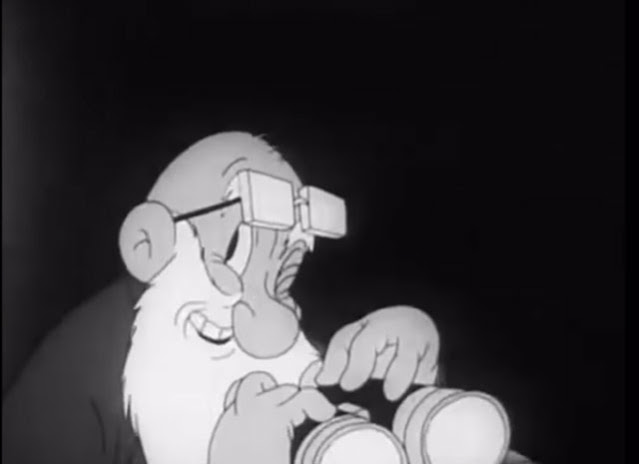Situation Normal, All Fouled Up
 |
| "The Home Front" is an unusual look at morale-building within the US Army during World War II. |
The US Army Signal Corps, largely staffed by Hollywood pros who had been drafted or volunteered for service, created a lot of propaganda during World War II. The big Hollywood studios donated their assets for wartime productions, so these efforts were of top quality using processes and actors that would have been used for typical shorts released by the studios during peacetime.
 |
| Illustrating the irreverent nature of "The Home Front," a "Technical Fairy First Class" gives our hero the "real scoop" on what's actually going on back in the States. |
While many people associate animation with Disney, Warner Brothers Animation Studios led the effort in several animation areas. One of these was the "Private SNAFU" series of patriotic shorts. SNAFU stands for "Situation Normal, All Fouled Up," a common phrase in the military where things always didn't seem to go according to plan (use your imagination as to what common four-letter word was usually substituted for "Fouled"). There were 26 black-and-white Private SNAFU shorts in all, produced between 1943 and 1945. The shorts were created to instruct service personnel in an entertaining fashion about security issues, proper sanitation habits, booby traps, and other military subjects. A major aim was to improve troop morale.
Since the Private SNAFU shorts were intended for a military audience (the name of the series itself indicates that), they by definition were not aimed at children. Thus, many contain many elements that were considered too risque for general audiences.
 |
| The dancer's pelvic thrust at the end of this clip was enough to get "The Home Front" banned. |
As an example, "The Home Front" was aimed squarely at troop morale. Soldiers resenting their separation from their families was addressed in "The Home Front," with a GI imagining that his family is living a life of ease while he is relegated to an uncomfortable outpost (which in this case appears to be Alaska). As the cartoon shows, however, everyone is pitching in for the war effort whether they are on the front lines or still at home. "The Home Front" has acquired an undeserved notorious reputation due to its being "banned," but there isn't anything in it that would offend modern audiences.
 |
| This is part of the sequence that got "The Home Front" banned. Grandad's reaction (and that of his binoculars) to the dancers was quite risque for the times and unmistakable. |
Voice legend Mel Blanc provides most of the voices in this short directed by Frank Tashlin, with music by Carl Stalling, and written by Phil Eastman and Theodore Geisel - the latter better known as Dr. Seuss.

No comments:
Post a Comment